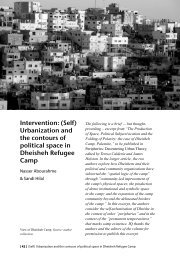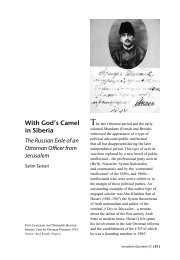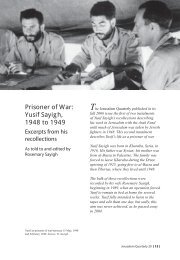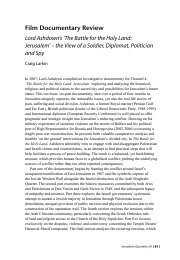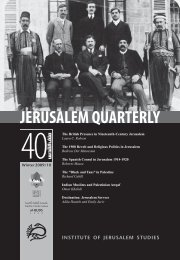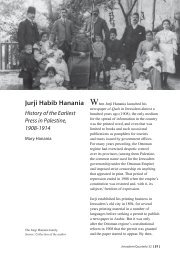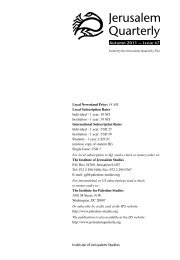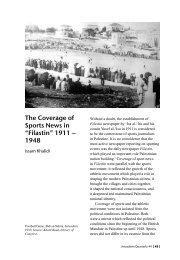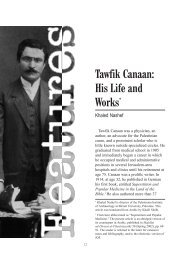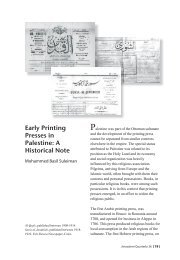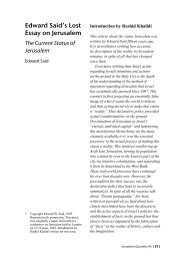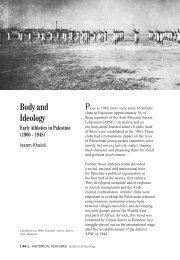PLUNDERING PALESTINE - Jerusalem Quarterly
PLUNDERING PALESTINE - Jerusalem Quarterly
PLUNDERING PALESTINE - Jerusalem Quarterly
You also want an ePaper? Increase the reach of your titles
YUMPU automatically turns print PDFs into web optimized ePapers that Google loves.
Two other things seem worthy of mention. First, here we are witnessing a moment that<br />
strikingly illustrates the way in which one culture emerges from the ashes of another;<br />
the ruin of Palestinian culture is the birth moment of a new Israeli consciousness based<br />
not only on erasing the Palestinians’ presence, but also on erasing their culture. Once<br />
the culture is erased, one can claim that it never existed – there is nothing to contradict<br />
or refute this conception. 15 Second, this letter not only underscores the act of takeover,<br />
but also its rhetoric: the books, which have been scattered everywhere, have finally<br />
come to rest in a safe place.<br />
Processing Arab Books: A Right and a Service Rendered<br />
At about the same time that this letter was sent to Dr. Warman (perhaps a bit earlier)<br />
the head of the Eastern Sciences Department at the National Library, Dr. Strauss,<br />
published a memo entitled, “Processing the Arab books from the occupied territories”.<br />
It was Strauss’ responsibility to receive the books, catalogue them and store them. His<br />
words attest both to his excitement at the growing influx of books, as well as to his<br />
resulting confusion and distress. It was a time of complete and total chaos; he found it<br />
difficult to handle the thousands of books and sort them properly, and his requests for<br />
help and more assistants have thus far been denied. In addition, the National Library<br />
had been forced to relocate from the Wolfson Building on the Mount Scopus campus<br />
to the Terra Sancta Building in western <strong>Jerusalem</strong>. The first part of the document<br />
reads:<br />
Since the National Library was granted the right to collect abandoned libraries<br />
in the occupied territories and began a comprehensive operation in<br />
<strong>Jerusalem</strong>’s Arab neighbourhood, nearly 9,000 books have been assembled.<br />
The number of books that were brought to the library in this way is greater<br />
than the number of Arabic books that have been collected by us throughout<br />
the years of this institution’s existence. And not only this, but also among the<br />
books that have been found in the occupied territories there is a substantial<br />
number of books that have not been in our possession before, and many<br />
newspapers (nicely bound) that are not in the National Library’s archive.<br />
Seeing that when approaching this task we have before our eyes the possibility<br />
of receiving some of the books as a fee for our services, indeed we<br />
have been given the opportunity to expand our collections considerably.<br />
However, in order to take advantage of this opportunity, we must invest<br />
much work in arranging and processing the books, which are in the meantime<br />
packed in sacks. Since the rules that would apply to these books have<br />
not been set yet, it is fitting that lists are compiled in a manner that would<br />
make it easier to reach an agreement in case the books are returned to their<br />
previous owners. For the authorities (the Israeli government and military<br />
governors) we shall provide lists that include the name of the author and<br />
[ 14 ] FEATURES Ownerless Objects?



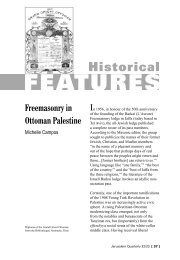
![In Search of Jerusalem Airport [pdf] - Jerusalem Quarterly](https://img.yumpu.com/49007736/1/180x260/in-search-of-jerusalem-airport-pdf-jerusalem-quarterly.jpg?quality=85)
